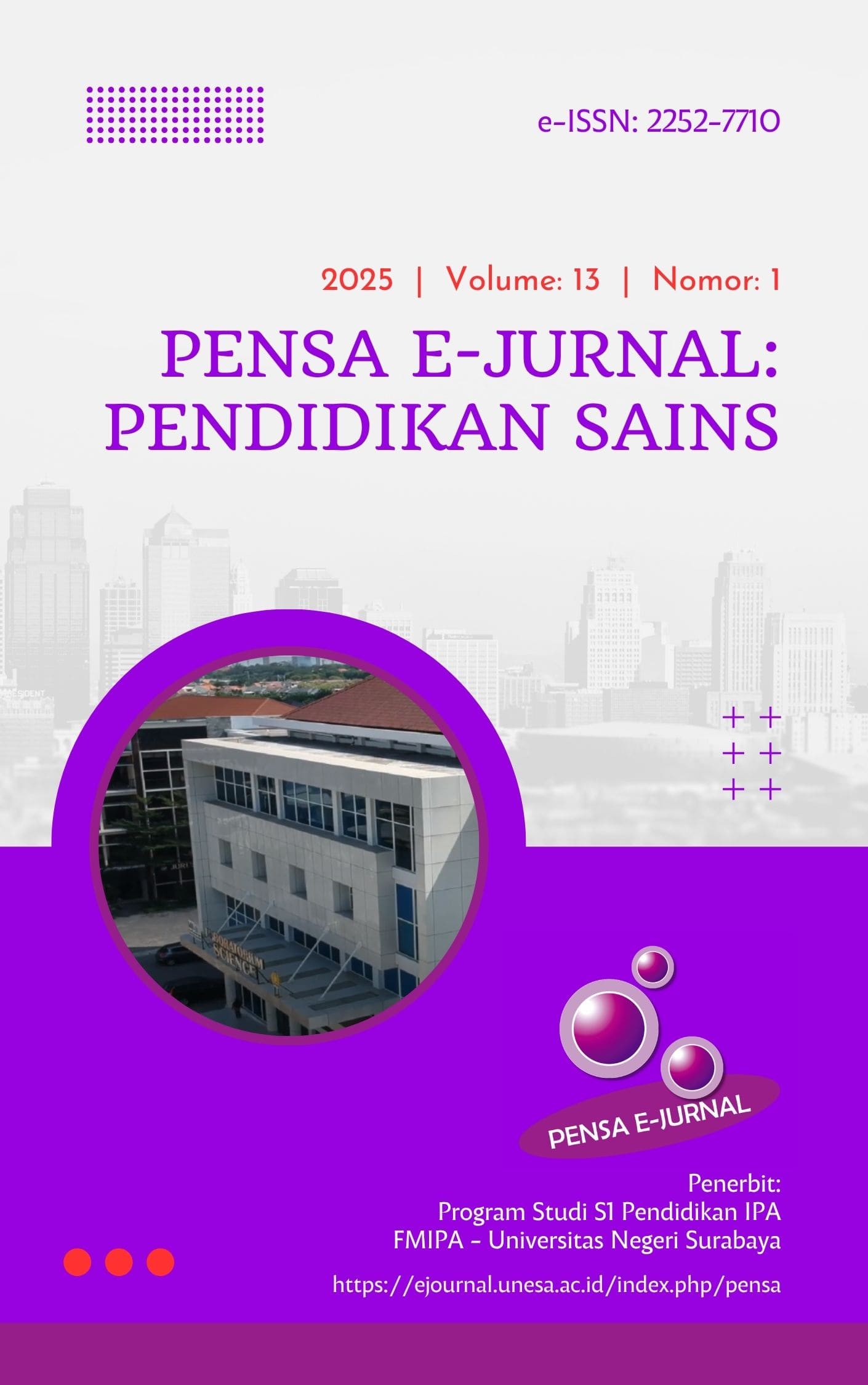ANALISIS KEMAMPUAN LITERASI SAINS IPA PADA SISWA SMP DALAM MEMECAHKAN SOAL IPA
DOI:
https://doi.org/10.26740/pensa.v13i1.58326Keywords:
Science Literacy, Scince, Junior high school studentsAbstract
This study aims to analyze the ability of science literacy in junior high school students in solving science problems. The research method used in this study is qualitative descriptive. This research was carried out at SMP Negeri 16 Surabaya in the odd semester of the 2023/2024 academic year. The subjects in this study were grade IX students of SMP Negeri 16 Surabaya totaling 21 students. The population in this placement was all grade IX students of SMP Negeri 16 Surabaya who were then sampled using the Random Sampling technique. The results of this study showed that the ability of science literacy in junior high school students in solving science problems was low with the highest percentage of 57.1% on indicators explaining phenomena scientifically while the lowest percentage was 33.3% on indicators of evaluating and designing scientific investigations. The conclusion in this study is that the ability of science literacy in junior high school students in solving science problems is included in the low category. The low ability of science literacy is caused because students are less accustomed to involving science literacy skills in a learning where it is influenced by various factors
Downloads
References
Akerson, V. L., & Bartels, S. L. (2023). Elementary science teaching: Toward the goal of scientific literacy. In Handbook of research on science education (pp. 528-558). Routledge.
Alfaeni, S. I., & Asbari, M. (2023). Kurikulum Merdeka: Fleksibilitas Kurikulum bagi Guru dan Siswa. Journal of Information Systems and Management (JISMA), 2(5), 86-92.
Fitria, Y., & Indra, W. (2020). Pengembangan model pembelajaran PBL berbasis digital untuk meningkatkan karakter peduli lingkungan dan literasi sains. Deepublish.
Fuadi, H., Robbia, AZ, Jamaluddin, J., & Jufri, AW (2020). Analisis faktor penyebab rendahnya kemampuan literasi ilmu pengetahuan peserta didik. Jurnal Ilmiah Profesi Pendidikan,5(2), 108-116. https://doi.org/10.29303/jipp.v5i2.122
Ikhlas, (2023). Pengaruh E-Lkpd Dalam Liveworksheets Berbasis Problem Based Learning Terhadap Kemampuan Literasi Sains Siswa Kelas Viii Pada Materi Sistem Ekskresi. https://digilib.unila.ac.id/76332/
Mujahidin, G. R., Rahman, G. G. A., Wilujeng, I., & Nugroho, S. D. (2023). Profil Literasi Sains Aspek Kompetensi Peserta Didik Melalui Pembelajaran Berbasis Budaya Lokal Reyog Ponorogo. Jurnal Penelitian Pendidikan IPA, 9(2), 965-970.
OECD. (2019b). Programme for international student assessment (pisa) results from pisa 2018. Oecd, 1–10. https://www.oecd-ilibrary.org/education/pisa-2018-results-volume-iii_bd69f805-en%0Ahttps://www.oecd-ilibrary.org//sites/bd69f805-en/index.html?itemId=/content/component/bd69f805-en#fig86
Permendikbudristek. (2022). Keputusan Kepala Badan Standar Kuruikulum dan Asesmen Pendidikan Kemendikbudristek No 033 tahun 2022 tentang capaian Pembelajaran pada kurikulum merdeka. Jakarta.
Sugiarto, F. (2023). Pengembangan Instrumen Penilaian HOTS Berbasis Literasi Geografi untuk Meningkatkan Kemampuan Berpikir Kritis Siswa SMP Insan Cendekia Al Mujtaba Tahun Pelajaran 2022/2023 (Materi: Maritim dan Agrikultur Indonesia) (Doctoral dissertation, UNS (Sebelas Maret University)).
Suriani, N., & Jailani, M. S. (2023). Konsep Populasi dan Sampling Serta Pemilihan Partisipan Ditinjau Dari Penelitian Ilmiah Pendidikan. IHSAN: Jurnal Pendidikan Islam, 1(2), 24-36.
Downloads
Published
How to Cite
Issue
Section
License
Copyright (c) 2025 PENSA E-JURNAL: PENDIDIKAN SAINS

This work is licensed under a Creative Commons Attribution 4.0 International License.
 Abstract views: 143
,
Abstract views: 143
, PDF Downloads: 122
PDF Downloads: 122

















